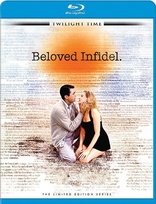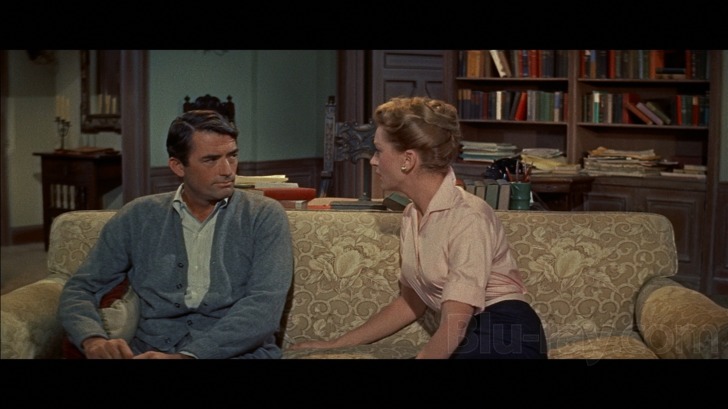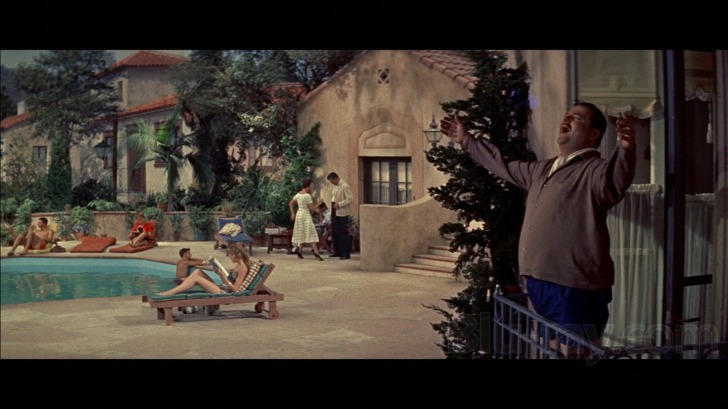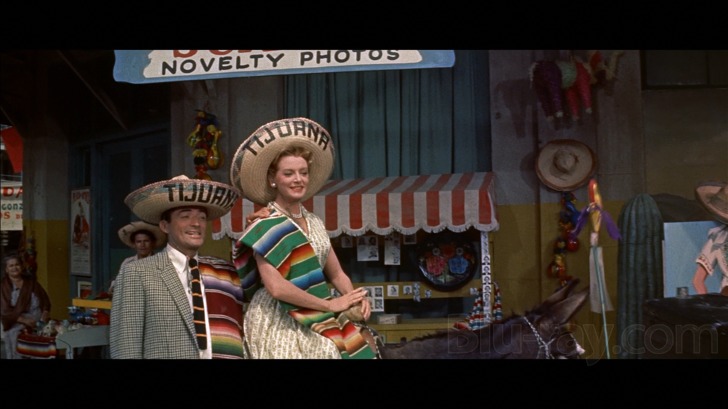Beloved Infidel Blu-ray Movie
HomeBeloved Infidel Blu-ray Movie 
Limited Edition to 3000 - SOLD OUTTwilight Time | 1959 | 123 min | Not rated | Dec 11, 2012

Movie rating
6.8 | / 10 |
Blu-ray rating
| Users | 0.0 | |
| Reviewer | 2.5 | |
| Overall | 2.5 |
Overview
Beloved Infidel (1959)
In 1936, the witty columnist Sheilah Graham meets the decadent writer F. Scott Fitzgerald, and they immediately fall in love, but their relationship is affected by his drinking problem.
Starring: Gregory Peck, Deborah Kerr, Eddie Albert, Philip Ober, Herbert RudleyDirector: Henry King
| Romance | Uncertain |
| Drama | Uncertain |
Specifications
Video
Video codec: MPEG-4 AVC
Video resolution: 1080p
Aspect ratio: 2.35:1
Original aspect ratio: 2.35:1
Audio
English: DTS-HD Master Audio 4.0 (48kHz, 24-bit)
Music: DTS-HD Master Audio 2.0
Subtitles
English SDH
Discs
50GB Blu-ray Disc
Single disc (1 BD)
Playback
Region free
Review
Rating summary
| Movie | 2.0 | |
| Video | 3.5 | |
| Audio | 4.0 | |
| Extras | 1.5 | |
| Overall | 2.5 |
Beloved Infidel Blu-ray Movie Review
A Star is Shorn.
Reviewed by Jeffrey Kauffman December 12, 2012Most actors, especially established stars, yearn for roles that allow them to stretch their performance muscles and play against type. Most big stars who attained their status in the heyday of the studio system often found themselves stifled by typecasting, especially if they enjoyed overwhelming success in any given role. Studio executives weren’t about to risk placing an established property in something unexpected, and if the paying public had shown their approval by lining up at the box office for, say, Tyrone Power as a swashbuckling hero, then Tyrone Power as a swashbuckling hero is exactly what the public would be offered. Over and over. Many of the most pointed disputes in the Golden Era of Hollywood had the subtext of actors trying to break out of this predetermined mold. Power himself in fact attempted to play against type in the 1946 film version of W. Somerset Maugham’s The Razor’s Edge, delivering a surprisingly nuanced performance in a difficult role. (Intrestingly, Maugham’s Of Human Bondage in its first film adaptation provided a defining role for Bette Davis early in her career.) Another legendary writer with a first initial followed by a middle and surname, one F. Scott Fitzgerald, had his own battles with “type casting” in Hollywood. After having been arguably the most popular writer in the world (or at least America) in the 1920s, Fitzgerald descended into an alcoholic haze from which he never really fully recovered. Hollywood attempted to squeeze what it could out of the once profligate author, but Fitzgerald’s days in Los Angeles were neither very productive nor very successful. Fitzgerald’s Hollywood years became yet another object lesson in playing against type when Gregory Peck was cast to play the author in the 1959 film version of Sheilah Graham’s memoir Beloved Infidel. Peck is so indelibly imprinted on the general public consciousness as Atticus Finch in To Kill a Mockingbird that it’s sometimes hard to remember some of the darker, less heroic roles that Peck tackled at various times, notably Duel in the Sun. But there was such an innate decency emanating from Peck that even when the actor did play less morally upright characters something seemed slightly out of place, and that’s certainly the case with Beloved Infidel. Peck’s unease in his role is matched, perhaps relatively less noticeably, by Deborah Kerr as Sheilah Graham, one of the great provocateurs of her time (rather like Dorothy Parker), and Kerr, like Peck playing against type, doesn’t quite seem to know what to make of her character. That leaves two iconic performers flailing about in a pretty sudsy melodrama that is, to put it mildly, a rather depressing look at a doomed love affair between two mismatched souls.

As odd as the casting choices in Beloved Infidel inarguably are, the film itself is a rather peculiar enterprise even disregarding its stars. Though Beloved Infidel in book form had sold well, neither Graham nor Fitzgerald (as surprising as it may sound to us today) were exactly household names in 1959. Furthermore, the film is shorn of virtually any real reference to time or place, as if casual comments like “I have to interview Gable” or the sight of a vintage automobile will immediately anchor it in viewers’ minds as taking place in the 1930s. For a film ostensibly about the down and dirty world of Hollywood, it’s an innately clean, almost hygienically pristine, film with little bite or menace, another kind of odd thing, considering its two main characters.
The film tries to make both Graham and Fitzgerald rather conventional characters, a perhaps fatal mistake. The real life Graham was virtually nothing like the character portrayed by Kerr in the film. Graham (née Lily Sheil) was the child of poor Jewish immigrants and was raised in an environment of poverty and hardscrabble ways, and by the time she emigrated to America in the early thirties and had already married (while still in her teens), hardly the patrician “insider” affianced to a Marquess portrayed in the film. (Graham indeed did indeed become engaged to the Marquess of Donegall after she divorced her first husband.) Kerr made a career out of playing “veddy” proper, kind of inherently uptight, women, and she simply doesn’t have the brusque viciousness that marked Graham’s early Hollywood years.
Much like Kerr as Graham, Peck simply seems too nice to be portraying such a haunted man as F. Scott Fitzgerald. So much important emotional context is given short shrift in Sy Bartlett’s screenplay that it actually isn’t entirely the actor’s fault. When a plot point as important as Zelda Fitzgerald’s mental instability and institutionalization is basically dealt with anecdotally (by Eddie Albert, no less), it gives the film a strangely dissociative quality that divorces it from the very elements which would have seemed to provide the most compelling content. Instead we’re left with two very glamorous stars portraying two very glamorous (if troubled) people who seem to have little to no connection to their real life counterparts.
Beloved Infidel plays almost like yet another version of A Star is Born, with an up and coming female supplanting her once very famous husband (surrogate in this case) in the Hollywood pecking order. And actually quite a bit like the 1954 version of that iconic story, Beloved Infidel seems bloated and simply too “shiny” (for want of a better term) for its own roiling emotional content. The 1954 A Star is Born actually manages to deliver some visceral emotional impact despite its flaws, but Beloved Infidel just kind of sits there like a beautifully made up but vacuous movie star, waiting for its close-up.
Beloved Infidel Blu-ray Movie, Video Quality 

Beloved Infidel is presented on Blu-ray courtesy of Twilight Time with an AVC encoded 1080p transfer in 2.35:1. For whatever reasons, the Fox titles Twilight Time licenses sometimes don't seem to have quite the pop that the label's Columbia titles do, and that's the case here as well. While the image is generally very sharp and well defined, this transfer also shows rather persistent ringing, especially in some of the beachside scenes where the characters walk in front of brighter backgrounds. The elements are in generally excellent shape, with only the expected very minor age related wear and tear visible. Colors, while accurate and well saturated, seem to be ever so slightly faded. Some of the stock footage is noticeably grainier and is less pristine condition than the bulk of the film. (I'm not sure if the pan across the harbor under the opening credits is stock footage or not, but the camera operator was extremely unsteady—have your Dramamine ready, perhaps appropriate given the shipside setting.)
Beloved Infidel Blu-ray Movie, Audio Quality 

Beloved Infidel features a lossless DTS-HD Master Audio 4.0 mix that is rather conservative in terms of any real consistent use of the rear channels but which does nicely separate things across the front of the soundstage. Dialogue is very cleanly and clearly presented, and Franz Waxman's score, which does populate all four channels rather well, sounds fantastic and full bodied. Dynamic range is fairly limited, aside from a couple of outbursts later in the film.
Beloved Infidel Blu-ray Movie, Special Features and Extras 

- Theatrical Trailer (480p; 2:15) is hilariously narrated by Gregory Peck, including the timeless adage, "He took her by the hand and led her to breathless fulfillment."
- Isolated Score. Franz Waxman's expressive score (with some spoken cue numbers) is presented via DTS-HD Master Audio 2.0. Lyricist Paul Francis Webster must have been thrilled to get the songwriting assignment for a tune that had to be called Beloved Infidel.
Beloved Infidel Blu-ray Movie, Overall Score and Recommendation 

Beloved Infidel is a big, glossy entertainment, but that's it chief problem. There was no real reason for a 1959 film to be this scrubbed clean of any grit and grime, despite its supposedly elegant Hollywood setting. Peck and Kerr are just fatally miscast in this film, and even with the always reliable Henry King at the helm, things kind of flounder uncontrollably with the result playing like some kind of high-falutin' soap opera. Lovers of Franz Waxman may well want to get this disc due to the luscious isolated score, but the film itself is a largely wasted effort.
Similar titles
Similar titles you might also like

A Summer Place
Warner Archive Collection
1959

Sadie McKee
Warner Archive Collection
1934

A Star Is Born
1954

God's Own Country
2017

Last Night
2010

Last Chance Harvey
2008

Stella Dallas
1937

Nights in Rodanthe
2008

Millie
1931

The Bridges of Madison County
1995

Message in a Bottle
1999

Internes Can't Take Money
1937

Imitation of Life
1959

Revolutionary Road
2008

Romeo + Juliet
William Shakespeare's Romeo + Juliet
1996

Intermezzo: A Love Story
1939

The Jane Austen Book Club
2007

When a Man Loves a Woman
1994

Frida
2002

Under Capricorn
1949